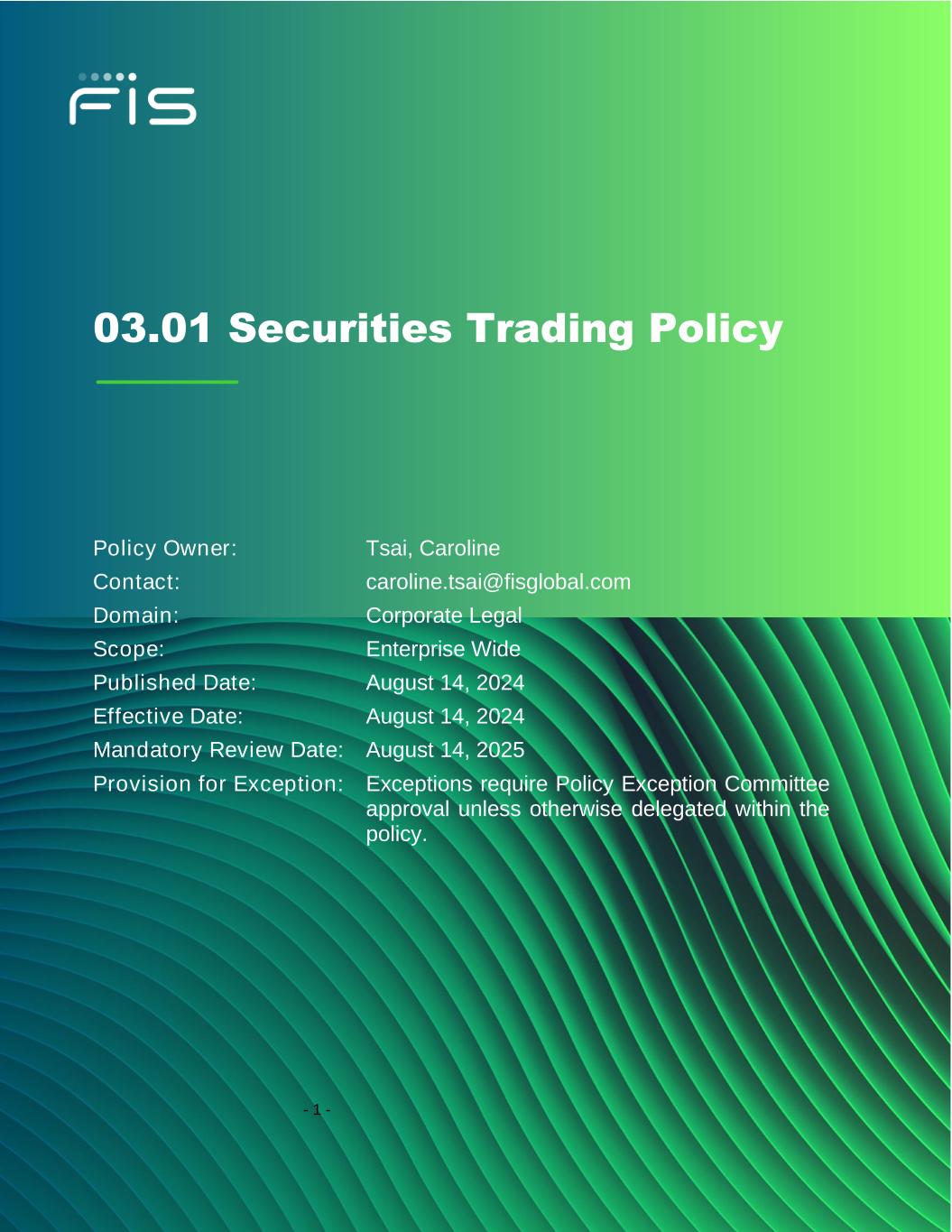
- 1 - 03.01 Securities Trading Policy Policy Owner: Tsai, Caroline Contact: caroline.tsai@fisglobal.com Domain: Corporate Legal Scope: Enterprise Wide Published Date: August 14, 2024 Effective Date: August 14, 2024 Mandatory Review Date: August 14, 2025 Provision for Exception: Exceptions require Policy Exception Committee approval unless otherwise delegated within the policy.

03.01 Securities Trading Policy 03.01 Securities Trading Policy .......................................................................................................................................... 3 03.01.01 Statement on Prohibited Activities ........................................................................................................................ 3 03.01.02 Consult the Chief Legal Officer for Guidance ....................................................................................................... 5 03.01.03 Key Definitions ...................................................................................................................................................... 5 03.01.03.01 Section 16 Individuals ................................................................................................................................... 5 03.01.03.02 Key Employees ............................................................................................................................................. 5 03.01.03.03 Material Information ...................................................................................................................................... 5 03.01.03.04 Nonpublic Information ................................................................................................................................... 6 03.01.03.05 Controlling Persons ...................................................................................................................................... 6 03.01.04 Oversight .............................................................................................................................................................. 6 03.01.05 Trading Windows and Blackout Periods ............................................................................................................... 7 03.01.05.01 Trading Window for Section 16 Individuals and Key Employees ................................................................. 7 03.01.05.02 No Trading During Trading Windows While in the Possession of Material Nonpublic Information .............. 7 03.01.05.03 No Trading During Blackout Periods ............................................................................................................ 7 03.01.05.04 Exceptions for Hardship Cases .................................................................................................................... 7 03.01.05.05 Special Blackout Periods .............................................................................................................................. 7 03.01.06 Employee Benefit Plans ....................................................................................................................................... 8 03.01.06.01 Employee Stock Purchase Plans ................................................................................................................. 8 03.01.06.02 Stock Option Plans ....................................................................................................................................... 8 03.01.06.03 Restricted Stock Awards, RSUs and PSUs.................................................................................................. 8 03.01.06.04 Dividend Reinvestment Plans ...................................................................................................................... 8 03.01.07 Procedures for Approving Trades by Section 16 Individuals, Key Employees and Hardship Cases .................. 8 03.01.07.01 Section 16 Individual and Key Employee Trades ......................................................................................... 8 03.01.07.02 Hardship Cases ............................................................................................................................................ 9 03.01.07.03 No Obligation to Approve Trades ................................................................................................................. 9 03.01.07.04 Individual Responsibility ............................................................................................................................... 9 03.01.08 Pre-Approved Insider Trading Plans .................................................................................................................... 9 03.01.08.01 Trading Plans Approved by Chief Legal Officer ........................................................................................... 9 03.01.08.02 Requirements for a Trading Plan ................................................................................................................. 9 03.01.09 Priority of Statutory or Regulatory Trading Restrictions ..................................................................................... 11 03.01.10 Potential Civil, Criminal and Disciplinary Sanctions ........................................................................................... 11 03.01.10.01 Civil and Criminal Penalties ........................................................................................................................ 11 03.01.10.02 Company Discipline .................................................................................................................................... 11 03.01.10.03 Reporting of Violations ............................................................................................................................... 11 03.01.11 Inquiries .............................................................................................................................................................. 11
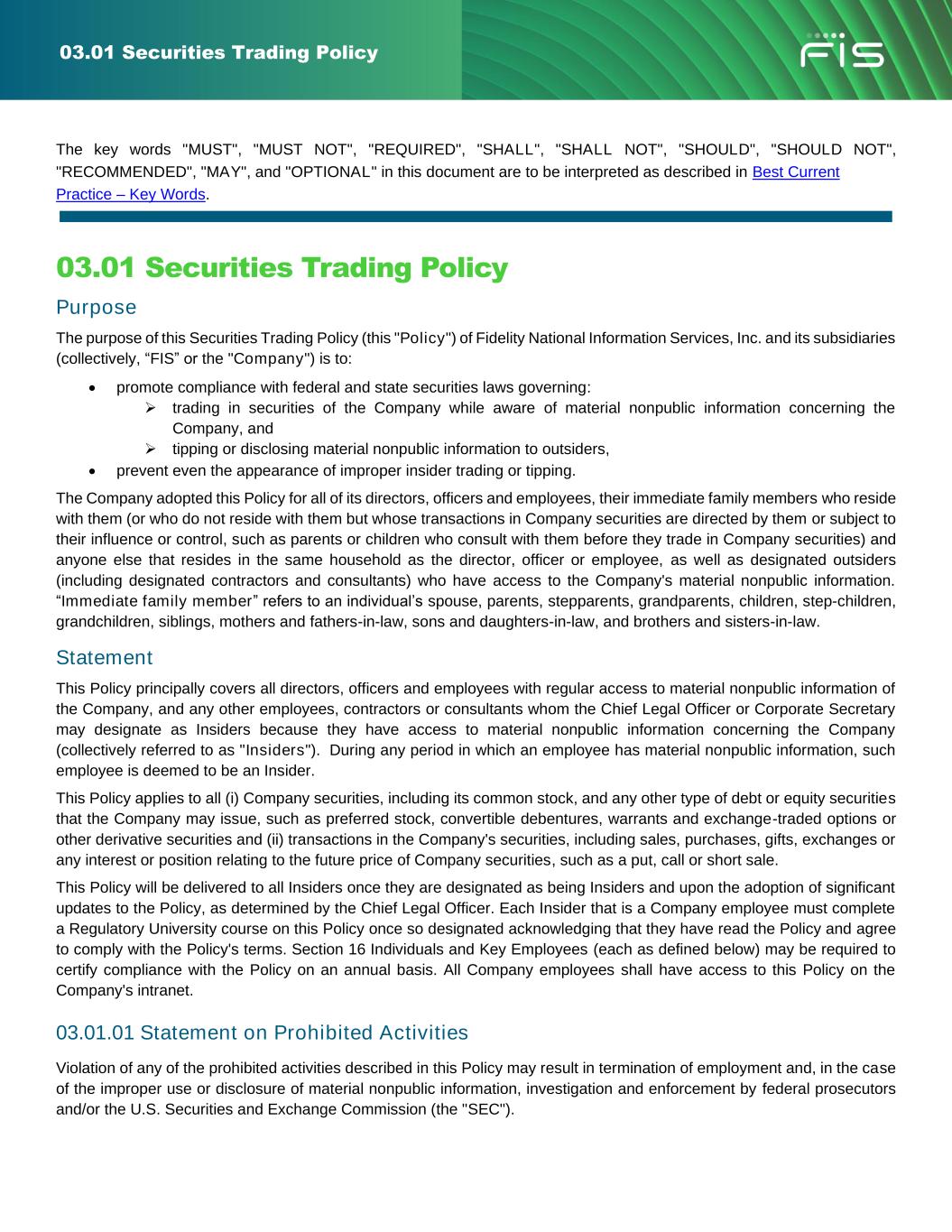
03.01 Securities Trading Policy The key words "MUST", "MUST NOT", "REQUIRED", "SHALL", "SHALL NOT", "SHOULD", "SHOULD NOT", "RECOMMENDED", "MAY", and "OPTIONAL" in this document are to be interpreted as described in Best Current Practice – Key Words. 03.01 Securities Trading Policy Purpose The purpose of this Securities Trading Policy (this "Policy") of Fidelity National Information Services, Inc. and its subsidiaries (collectively, “FIS” or the "Company") is to: • promote compliance with federal and state securities laws governing: ➢ trading in securities of the Company while aware of material nonpublic information concerning the Company, and ➢ tipping or disclosing material nonpublic information to outsiders, • prevent even the appearance of improper insider trading or tipping. The Company adopted this Policy for all of its directors, officers and employees, their immediate family members who reside with them (or who do not reside with them but whose transactions in Company securities are directed by them or subject to their influence or control, such as parents or children who consult with them before they trade in Company securities) and anyone else that resides in the same household as the director, officer or employee, as well as designated outsiders (including designated contractors and consultants) who have access to the Company's material nonpublic information. “Immediate family member” refers to an individual’s spouse, parents, stepparents, grandparents, children, step-children, grandchildren, siblings, mothers and fathers-in-law, sons and daughters-in-law, and brothers and sisters-in-law. Statement This Policy principally covers all directors, officers and employees with regular access to material nonpublic information of the Company, and any other employees, contractors or consultants whom the Chief Legal Officer or Corporate Secretary may designate as Insiders because they have access to material nonpublic information concerning the Company (collectively referred to as "Insiders"). During any period in which an employee has material nonpublic information, such employee is deemed to be an Insider. This Policy applies to all (i) Company securities, including its common stock, and any other type of debt or equity securities that the Company may issue, such as preferred stock, convertible debentures, warrants and exchange-traded options or other derivative securities and (ii) transactions in the Company's securities, including sales, purchases, gifts, exchanges or any interest or position relating to the future price of Company securities, such as a put, call or short sale. This Policy will be delivered to all Insiders once they are designated as being Insiders and upon the adoption of significant updates to the Policy, as determined by the Chief Legal Officer. Each Insider that is a Company employee must complete a Regulatory University course on this Policy once so designated acknowledging that they have read the Policy and agree to comply with the Policy's terms. Section 16 Individuals and Key Employees (each as defined below) may be required to certify compliance with the Policy on an annual basis. All Company employees shall have access to this Policy on the Company's intranet. 03.01.01 Statement on Prohibited Activities Violation of any of the prohibited activities described in this Policy may result in termination of employment and, in the case of the improper use or disclosure of material nonpublic information, investigation and enforcement by federal prosecutors and/or the U.S. Securities and Exchange Commission (the "SEC").

03.01 Securities Trading Policy • Neither the Company, nor any Insider, may trade in Company securities while aware of material nonpublic information concerning the Company. This prohibition shall not apply, however, to trades by the Company or Insiders that are performed pursuant to a Pre-Approved Insider Trading Plan, as described in this Policy. • No Insider may trade in Company securities outside of the applicable trading windows described in this Policy or during any special trading blackout periods designated by the Chief Legal Officer. This prohibition shall not apply, however, to trades by Insiders that are performed pursuant to a Pre-Approved Insider Trading Plan. • No Insider or employee of the Company may trade in Company securities during any period in which the Company has imposed a ban on trading Company securities, including those held through any employee benefit plan administered by the Company. • No Section 16 Individual or Key Employee may trade in Company securities unless the trade has been approved by the Chief Legal Officer (or his or her designee) in accordance with the procedures set forth in this Policy. Section 16 Individuals and Key Employees who wish to trade in Company securities may be required to sell their securities pursuant to a Pre-Approved Insider Trading Plan. • The Chief Legal Officer may not trade in Company securities unless the trade has been approved by the Chief Financial Officer or Corporate Secretary in accordance with the procedures set forth in this Policy. If the Corporate Secretary is also the Chief Legal Officer, any such trades must be approved by the Chief Financial Officer. • No Insider may tip or disclose material nonpublic information concerning the Company to any outside person (including, without limitation, family members, analysts, individual investors and members of the investment community and news media), unless such disclosure is required as part of that Insider's regular duties for the Company and is duly authorized. • No Insider may give trading advice of any kind about the Company’s securities to anyone while the Insider is aware of material nonpublic information about the Company. The Company strongly discourages all Insiders from giving trading advice concerning the Company's securities to third parties, even when the Insiders are not aware of material nonpublic information about the Company. • No Insider may engage in hedging, pledging and short sale transactions involving Company securities, as provided in the Company’s Hedging and Pledging Policy. • No Insider who, in the course of his or her Board service or employment at the Company, acquires material non- public information, may: ➢ trade in the securities of any other public company while the Insider is aware of material nonpublic information concerning that company; or ➢ tip or disclose to anyone outside FIS the material nonpublic information concerning such other company; or ➢ give trading advice of any kind to anyone concerning the securities of such other company while the Insider is aware of material nonpublic information about that company; or ➢ trade in the securities of other public companies (“linked companies”) in the same industry as FIS or as other companies with which FIS does business, where information relating to FIS or its business dealings with another company would be material with regard to an investment in the securities of the linked company. • No Insider or employee shall communicate any nonpublic information about the Company on any social media platform (including, but not limited to, Facebook, LinkedIn, Yammer, Instagram and X (formerly known as Twitter))
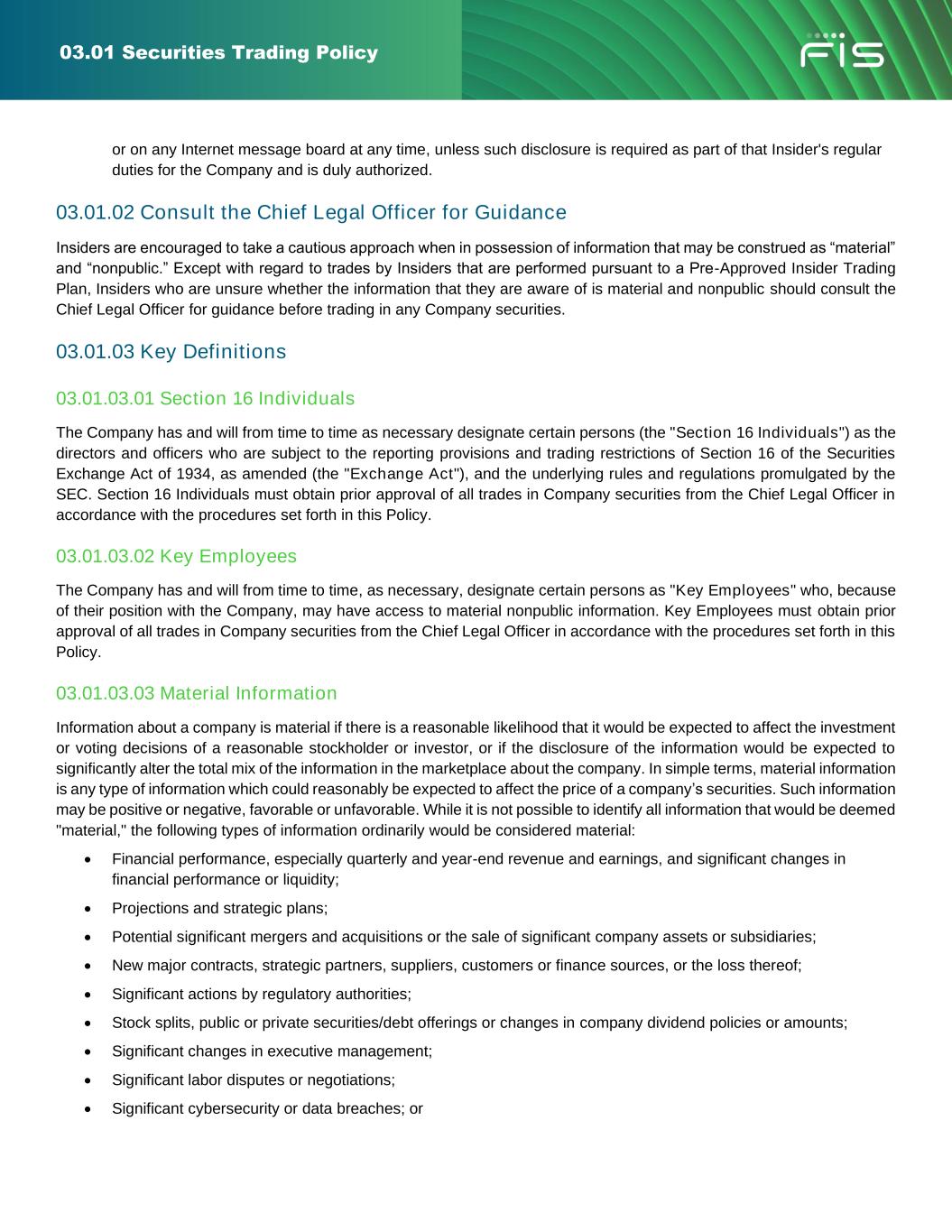
03.01 Securities Trading Policy or on any Internet message board at any time, unless such disclosure is required as part of that Insider's regular duties for the Company and is duly authorized. 03.01.02 Consult the Chief Legal Officer for Guidance Insiders are encouraged to take a cautious approach when in possession of information that may be construed as “material” and “nonpublic.” Except with regard to trades by Insiders that are performed pursuant to a Pre-Approved Insider Trading Plan, Insiders who are unsure whether the information that they are aware of is material and nonpublic should consult the Chief Legal Officer for guidance before trading in any Company securities. 03.01.03 Key Definitions 03.01.03.01 Section 16 Individuals The Company has and will from time to time as necessary designate certain persons (the "Section 16 Individuals") as the directors and officers who are subject to the reporting provisions and trading restrictions of Section 16 of the Securities Exchange Act of 1934, as amended (the "Exchange Act"), and the underlying rules and regulations promulgated by the SEC. Section 16 Individuals must obtain prior approval of all trades in Company securities from the Chief Legal Officer in accordance with the procedures set forth in this Policy. 03.01.03.02 Key Employees The Company has and will from time to time, as necessary, designate certain persons as "Key Employees" who, because of their position with the Company, may have access to material nonpublic information. Key Employees must obtain prior approval of all trades in Company securities from the Chief Legal Officer in accordance with the procedures set forth in this Policy. 03.01.03.03 Material Information Information about a company is material if there is a reasonable likelihood that it would be expected to affect the investment or voting decisions of a reasonable stockholder or investor, or if the disclosure of the information would be expected to significantly alter the total mix of the information in the marketplace about the company. In simple terms, material information is any type of information which could reasonably be expected to affect the price of a company’s securities. Such information may be positive or negative, favorable or unfavorable. While it is not possible to identify all information that would be deemed "material," the following types of information ordinarily would be considered material: • Financial performance, especially quarterly and year-end revenue and earnings, and significant changes in financial performance or liquidity; • Projections and strategic plans; • Potential significant mergers and acquisitions or the sale of significant company assets or subsidiaries; • New major contracts, strategic partners, suppliers, customers or finance sources, or the loss thereof; • Significant actions by regulatory authorities; • Stock splits, public or private securities/debt offerings or changes in company dividend policies or amounts; • Significant changes in executive management; • Significant labor disputes or negotiations; • Significant cybersecurity or data breaches; or

03.01 Securities Trading Policy • Actual or threatened major litigation or the resolution of such litigation. 03.01.03.04 Nonpublic Information Material information is nonpublic if it has not been widely disseminated to the public through major newswire services, national news services, financial news services, filings with the SEC, and webcasts of publicly announced investor conferences that are posted on the Company’s website. For the purposes of this Policy, information generally will be considered public (i.e., no longer nonpublic), after the close of trading on the second full trading day following the Company’s widespread public release of the information. Any exception to this general rule must be approved in advance by the Chief Legal Officer. 03.01.03.05 Controlling Persons All individuals who supervise, direct or manage the activities of any other employee of the Company may be deemed a “Controlling Person” for purposes of insider trading liability. The Company may be a Controlling Person of its employees. A Controlling Person may be subject to liability for insider trading or tipping by a controlled person if the Controlling Person knows or recklessly disregarded that the controlled person was likely to violate insider trading laws and failed to take steps to prevent such activity. All Controlling Persons are encouraged to be vigilant in monitoring the activities of controlled persons that possess, have access to or are aware of material nonpublic information and promptly report any suspicious activity to the Chief Legal Officer. Penalties for trading on or communicating material nonpublic information are severe, both for individuals involved in such unlawful conduct and their employers and supervisors. Controlling Persons are subject to a civil penalty of $1 million or three times the amount of profits realized or losses avoided due to insider trading or tipping of controlled persons. 03.01.04 Oversight The Company has designated its Chief Legal Officer to oversee this Policy. The Chief Legal Officer will review and either approve or prohibit all proposed trades by Section 16 Individuals and Key Employees in accordance with the procedures set forth below. In addition to the trading approval duties described in this Policy, the Chief Legal Officer shall have responsibility for: • Administering this Policy and monitoring and enforcing compliance with all Policy provisions and procedures. • Responding to all inquiries relating to this Policy and its procedures. • Designating and announcing special trading blackout periods during which no Insiders (including any employees that the Chief Legal Officer may designate as Insiders for the purposes of a particular blackout period because of their access to material non-public information) may trade in Company securities. At the discretion of the Chief Legal Officer, a special trading blackout period may be made applicable on a Company-wide basis to all employees. • Providing copies of this Policy and other appropriate materials to all current and new directors, officers and employees and such other persons who the Chief Legal Officer determines may have access to material nonpublic information concerning the Company. • Administering, monitoring, and enforcing compliance with all federal and state insider trading laws and regulations, including, without limitation, Sections 10(b), 16, 20A and 21A of the Exchange Act and the rules and regulations promulgated thereunder.
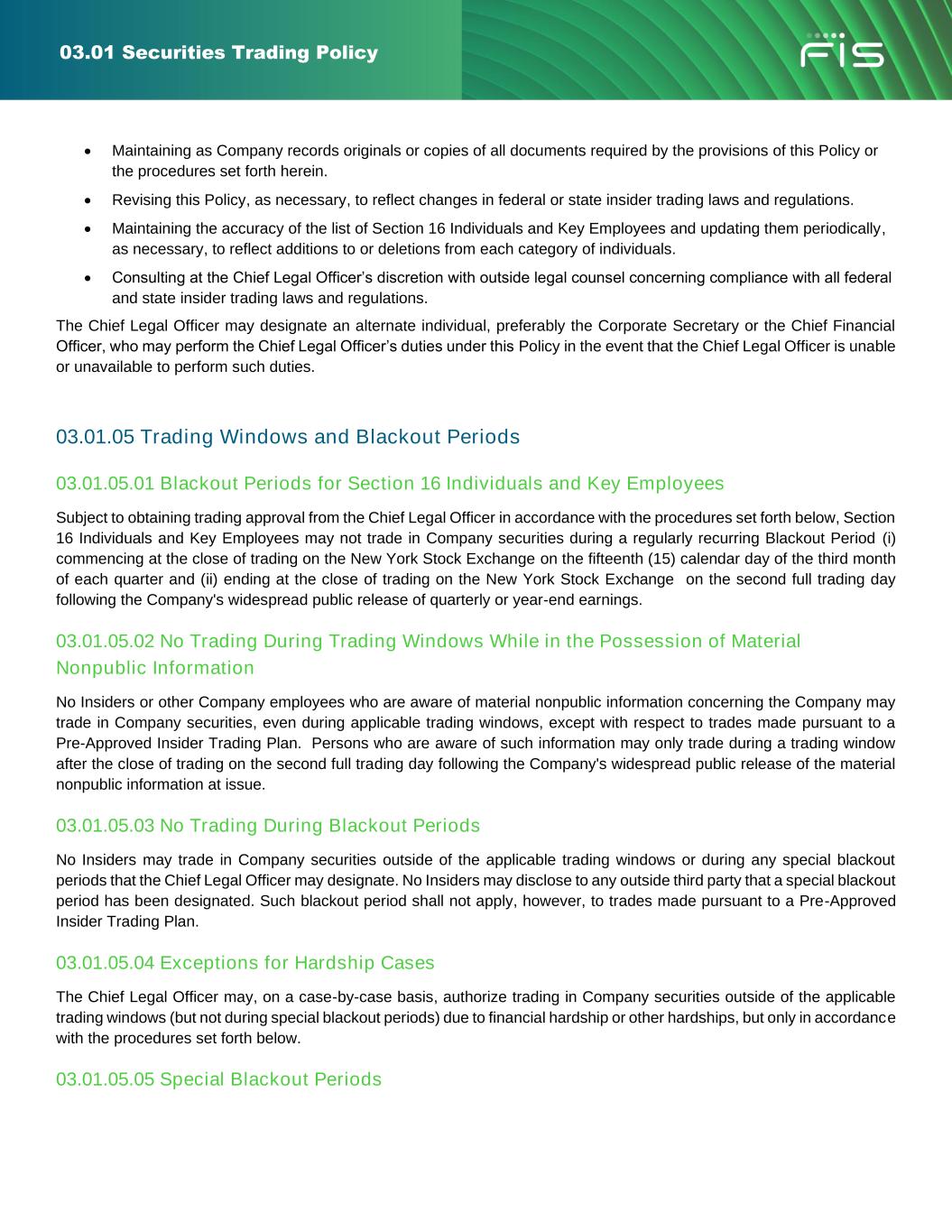
03.01 Securities Trading Policy • Maintaining as Company records originals or copies of all documents required by the provisions of this Policy or the procedures set forth herein. • Revising this Policy, as necessary, to reflect changes in federal or state insider trading laws and regulations. • Maintaining the accuracy of the list of Section 16 Individuals and Key Employees and updating them periodically, as necessary, to reflect additions to or deletions from each category of individuals. • Consulting at the Chief Legal Officer’s discretion with outside legal counsel concerning compliance with all federal and state insider trading laws and regulations. The Chief Legal Officer may designate an alternate individual, preferably the Corporate Secretary or the Chief Financial Officer, who may perform the Chief Legal Officer’s duties under this Policy in the event that the Chief Legal Officer is unable or unavailable to perform such duties. 03.01.05 Trading Windows and Blackout Periods 03.01.05.01 Blackout Periods for Section 16 Individuals and Key Employees Subject to obtaining trading approval from the Chief Legal Officer in accordance with the procedures set forth below, Section 16 Individuals and Key Employees may not trade in Company securities during a regularly recurring Blackout Period (i) commencing at the close of trading on the New York Stock Exchange on the fifteenth (15) calendar day of the third month of each quarter and (ii) ending at the close of trading on the New York Stock Exchange on the second full trading day following the Company's widespread public release of quarterly or year-end earnings. 03.01.05.02 No Trading During Trading Windows While in the Possession of Material Nonpublic Information No Insiders or other Company employees who are aware of material nonpublic information concerning the Company may trade in Company securities, even during applicable trading windows, except with respect to trades made pursuant to a Pre-Approved Insider Trading Plan. Persons who are aware of such information may only trade during a trading window after the close of trading on the second full trading day following the Company's widespread public release of the material nonpublic information at issue. 03.01.05.03 No Trading During Blackout Periods No Insiders may trade in Company securities outside of the applicable trading windows or during any special blackout periods that the Chief Legal Officer may designate. No Insiders may disclose to any outside third party that a special blackout period has been designated. Such blackout period shall not apply, however, to trades made pursuant to a Pre-Approved Insider Trading Plan. 03.01.05.04 Exceptions for Hardship Cases The Chief Legal Officer may, on a case-by-case basis, authorize trading in Company securities outside of the applicable trading windows (but not during special blackout periods) due to financial hardship or other hardships, but only in accordance with the procedures set forth below. 03.01.05.05 Special Blackout Periods
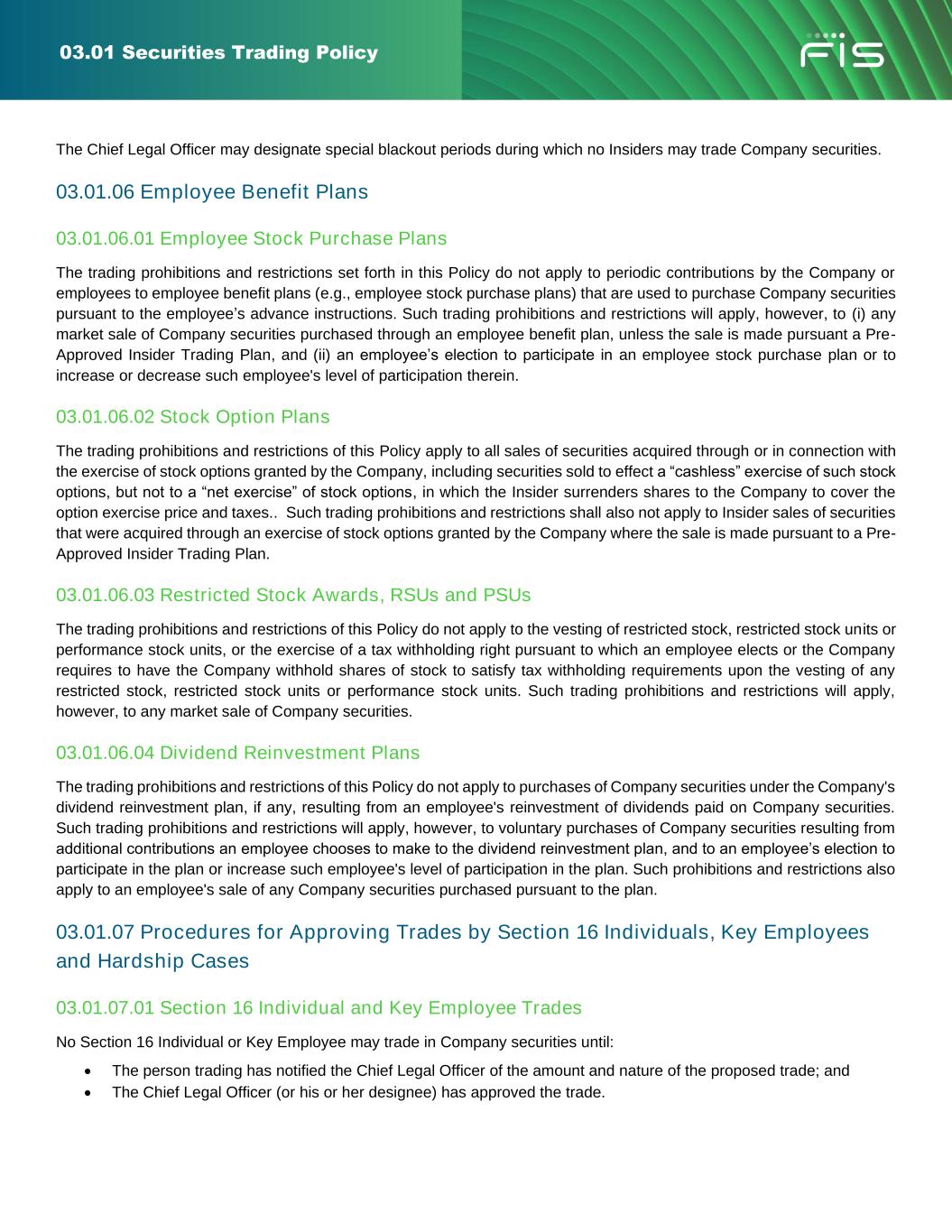
03.01 Securities Trading Policy The Chief Legal Officer may designate special blackout periods during which no Insiders may trade Company securities. 03.01.06 Employee Benefit Plans 03.01.06.01 Employee Stock Purchase Plans The trading prohibitions and restrictions set forth in this Policy do not apply to periodic contributions by the Company or employees to employee benefit plans (e.g., employee stock purchase plans) that are used to purchase Company securities pursuant to the employee’s advance instructions. Such trading prohibitions and restrictions will apply, however, to (i) any market sale of Company securities purchased through an employee benefit plan, unless the sale is made pursuant a Pre- Approved Insider Trading Plan, and (ii) an employee’s election to participate in an employee stock purchase plan or to increase or decrease such employee's level of participation therein. 03.01.06.02 Stock Option Plans The trading prohibitions and restrictions of this Policy apply to all sales of securities acquired through or in connection with the exercise of stock options granted by the Company, including securities sold to effect a “cashless” exercise of such stock options, but not to a “net exercise” of stock options, in which the Insider surrenders shares to the Company to cover the option exercise price and taxes.. Such trading prohibitions and restrictions shall also not apply to Insider sales of securities that were acquired through an exercise of stock options granted by the Company where the sale is made pursuant to a Pre- Approved Insider Trading Plan. 03.01.06.03 Restricted Stock Awards, RSUs and PSUs The trading prohibitions and restrictions of this Policy do not apply to the vesting of restricted stock, restricted stock units or performance stock units, or the exercise of a tax withholding right pursuant to which an employee elects or the Company requires to have the Company withhold shares of stock to satisfy tax withholding requirements upon the vesting of any restricted stock, restricted stock units or performance stock units. Such trading prohibitions and restrictions will apply, however, to any market sale of Company securities. 03.01.06.04 Dividend Reinvestment Plans The trading prohibitions and restrictions of this Policy do not apply to purchases of Company securities under the Company's dividend reinvestment plan, if any, resulting from an employee's reinvestment of dividends paid on Company securities. Such trading prohibitions and restrictions will apply, however, to voluntary purchases of Company securities resulting from additional contributions an employee chooses to make to the dividend reinvestment plan, and to an employee’s election to participate in the plan or increase such employee's level of participation in the plan. Such prohibitions and restrictions also apply to an employee's sale of any Company securities purchased pursuant to the plan. 03.01.07 Procedures for Approving Trades by Section 16 Individuals, Key Employees and Hardship Cases 03.01.07.01 Section 16 Individual and Key Employee Trades No Section 16 Individual or Key Employee may trade in Company securities until: • The person trading has notified the Chief Legal Officer of the amount and nature of the proposed trade; and • The Chief Legal Officer (or his or her designee) has approved the trade.
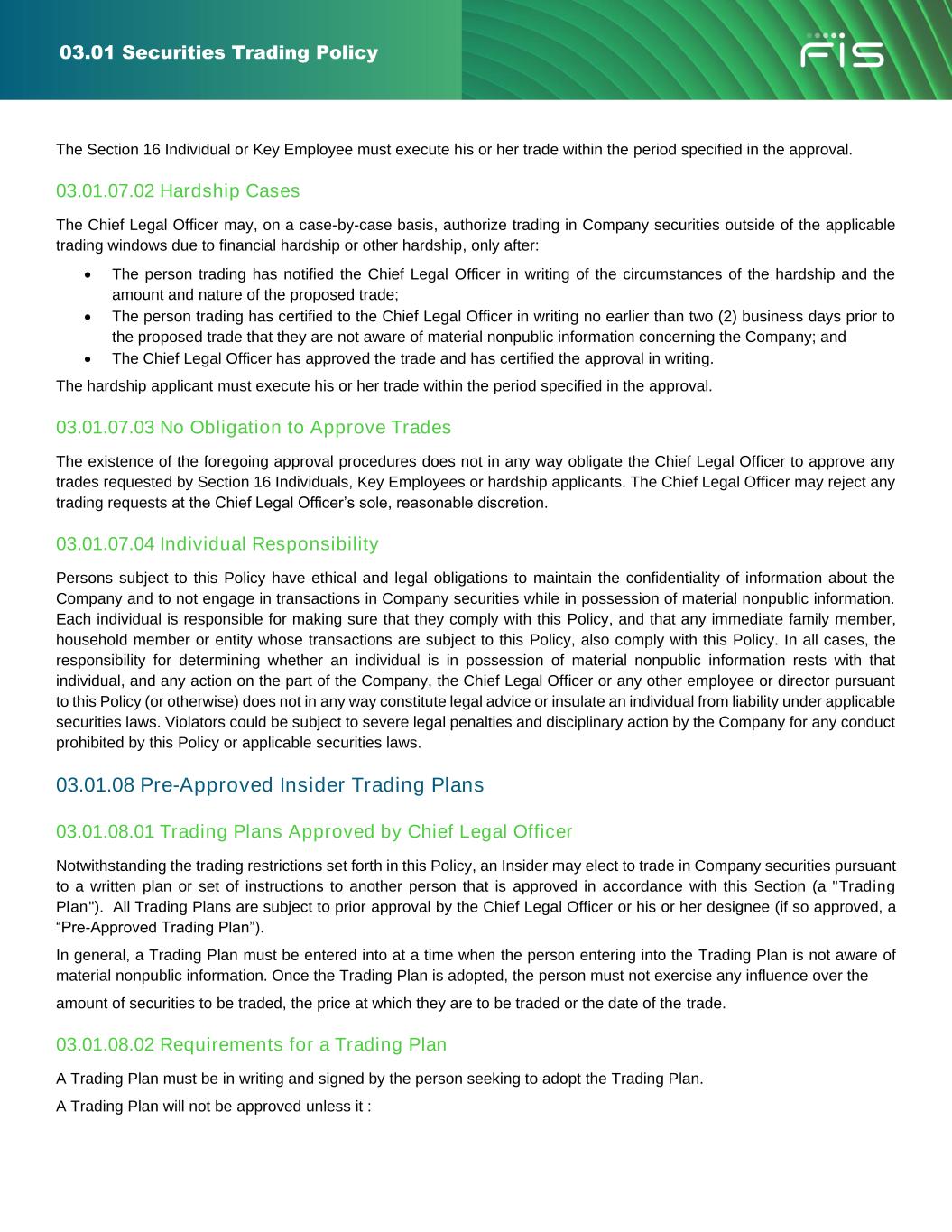
03.01 Securities Trading Policy The Section 16 Individual or Key Employee must execute his or her trade within the period specified in the approval. 03.01.07.02 Hardship Cases The Chief Legal Officer may, on a case-by-case basis, authorize trading in Company securities outside of the applicable trading windows due to financial hardship or other hardship, only after: • The person trading has notified the Chief Legal Officer in writing of the circumstances of the hardship and the amount and nature of the proposed trade; • The person trading has certified to the Chief Legal Officer in writing no earlier than two (2) business days prior to the proposed trade that they are not aware of material nonpublic information concerning the Company; and • The Chief Legal Officer has approved the trade and has certified the approval in writing. The hardship applicant must execute his or her trade within the period specified in the approval. 03.01.07.03 No Obligation to Approve Trades The existence of the foregoing approval procedures does not in any way obligate the Chief Legal Officer to approve any trades requested by Section 16 Individuals, Key Employees or hardship applicants. The Chief Legal Officer may reject any trading requests at the Chief Legal Officer’s sole, reasonable discretion. 03.01.07.04 Individual Responsibility Persons subject to this Policy have ethical and legal obligations to maintain the confidentiality of information about the Company and to not engage in transactions in Company securities while in possession of material nonpublic information. Each individual is responsible for making sure that they comply with this Policy, and that any immediate family member, household member or entity whose transactions are subject to this Policy, also comply with this Policy. In all cases, the responsibility for determining whether an individual is in possession of material nonpublic information rests with that individual, and any action on the part of the Company, the Chief Legal Officer or any other employee or director pursuant to this Policy (or otherwise) does not in any way constitute legal advice or insulate an individual from liability under applicable securities laws. Violators could be subject to severe legal penalties and disciplinary action by the Company for any conduct prohibited by this Policy or applicable securities laws. 03.01.08 Pre-Approved Insider Trading Plans 03.01.08.01 Trading Plans Approved by Chief Legal Officer Notwithstanding the trading restrictions set forth in this Policy, an Insider may elect to trade in Company securities pursuant to a written plan or set of instructions to another person that is approved in accordance with this Section (a "Trading Plan"). All Trading Plans are subject to prior approval by the Chief Legal Officer or his or her designee (if so approved, a “Pre-Approved Trading Plan”). In general, a Trading Plan must be entered into at a time when the person entering into the Trading Plan is not aware of material nonpublic information. Once the Trading Plan is adopted, the person must not exercise any influence over the amount of securities to be traded, the price at which they are to be traded or the date of the trade. 03.01.08.02 Requirements for a Trading Plan A Trading Plan must be in writing and signed by the person seeking to adopt the Trading Plan. A Trading Plan will not be approved unless it :

03.01 Securities Trading Policy • Specifies either the specific amount of securities to be traded (either a specified number of securities or a specified dollar value of securities); the price at which the securities are to be traded; and the date on which the order is to be executed (either the specific day of the year on which the order is to be executed-or as soon thereafter as is practicable under ordinary principles of best execution-in the case of a market order, or, in the case of a limit order, a day of the year on which the limit order is in force); or • Includes a written formula or algorithm, or computer program for determining the amount of securities that are to be purchased or sold and the price at which and the date on which the securities are to be purchased or sold; or • Grants complete investment discretion to another person (a "Representative") and does not permit the Insider to exercise any subsequent influence over how, when, or whether to effect trades. Reliance upon this provision will also require a signed affirmation by the Representative that such Representative will not exercise this complete grant of discretion to trade on such securities while such Representative is aware of material nonpublic information about the Company or its securities. If a Trading Plan is adopted, all trades must be made pursuant to the Trading Plan, unless otherwise approved in advance by the Chief Legal Officer. Insiders seeking to utilize a Trading Plan may not, in any manner, alter or deviate from the trading instructions set forth in a Trading Plan, including changing the amount, price, or timing of the trade. Trading Plans may be terminated only with the prior approval of the Chief Legal Officer. Insiders may not in any way discuss with their designated Representative or stockbroker the Company, information about the Company, or the timing of the trading in the Company's securities (other than to confirm that they have given instructions and set forth their contents). After adopting a Trading Plan, Insiders are not allowed to enter into any corresponding or hedging transaction or position with respect to the Company's securities. Any Section 16 individual will be required to include in the Trading Plan written representations certifying that he or she ( i) is not aware of material nonpublic information about the Company or its securities and (ii) is adopting or modifying the plan in good faith and not as part of a plan or scheme to evade the prohibitions of Exchange Act Rule 10b-5-1. No person seeking to adopt a Trading Plan may do so if they are aware of any material nonpublic information about the Company or the Company's securities. Rule 10b5-1 of the Exchange Act requires that any Insider who enters into a Trading Plan act in good faith with respect to the Trading Plan and not as a part of a plan or scheme to evade the prohibitions of any insider trading laws, rules, or regulations. No Insider may enter into a Trading Plan outside of the applicable "trading windows" described in this Policy or during any special trading blackout periods designated by the Chief Legal Officer. All Trading Plans for Section 16 Individuals are subject to a “cooling off” period of the longer of: (a) 90 days following Trading Plan adoption or modification, or (b) two business days following disclosure in Form 10-K or 10-Q of the Company’s financial results for the fiscal quarter in which the Trading Plan was adopted or modified (but not to exceed 120 days following Trading Plan adoption or modification) before any trade order may be executed. All Trading Plans for persons other than the Company and Section 16 Individuals are subject to a thirty (30) day “cooling off” period before any trade order may be executed. No Insider may enter into overlapping Trading Plans (subject to certain exceptions) and may only enter into one single-trade Trading Plan during any 12-month period (subject to certain exceptions). Notwithstanding anything in this Policy to the contrary, all Trading Plans are subject to the requirements set forth in Rule 10b5-1 of the Exchange Act and will be interpreted to ensure compliance with Rule 10b5-1 of the Exchange Act. The Company reserves the right to reject any Trading Plan which, in its judgment, does not satisfy the requirements above or that generally does not comply with the provisions of Rule 10b5-1 of the Exchange Act.
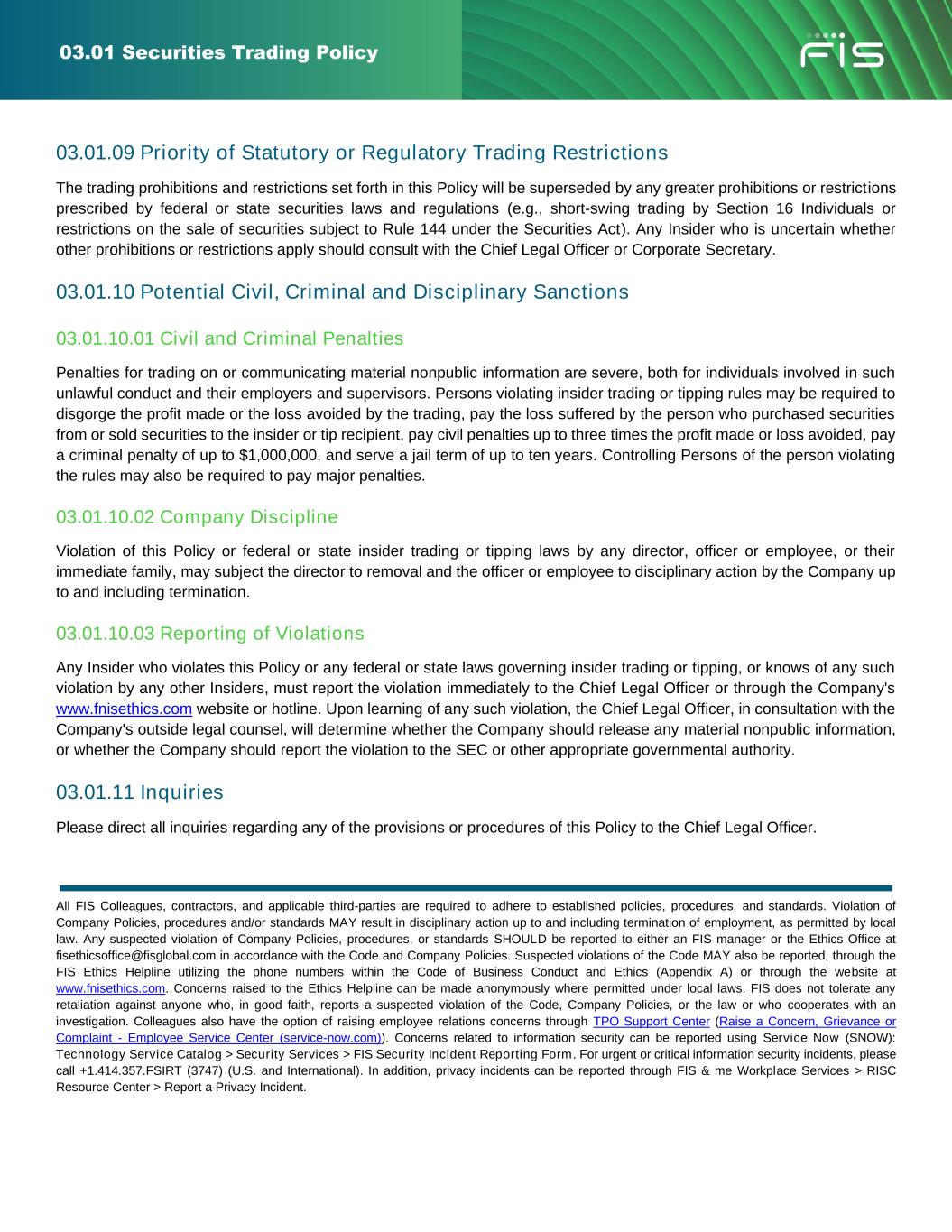
03.01 Securities Trading Policy 03.01.09 Priority of Statutory or Regulatory Trading Restrictions The trading prohibitions and restrictions set forth in this Policy will be superseded by any greater prohibitions or restrictions prescribed by federal or state securities laws and regulations (e.g., short-swing trading by Section 16 Individuals or restrictions on the sale of securities subject to Rule 144 under the Securities Act). Any Insider who is uncertain whether other prohibitions or restrictions apply should consult with the Chief Legal Officer or Corporate Secretary. 03.01.10 Potential Civil, Criminal and Disciplinary Sanctions 03.01.10.01 Civil and Criminal Penalties Penalties for trading on or communicating material nonpublic information are severe, both for individuals involved in such unlawful conduct and their employers and supervisors. Persons violating insider trading or tipping rules may be required to disgorge the profit made or the loss avoided by the trading, pay the loss suffered by the person who purchased securities from or sold securities to the insider or tip recipient, pay civil penalties up to three times the profit made or loss avoided, pay a criminal penalty of up to $1,000,000, and serve a jail term of up to ten years. Controlling Persons of the person violating the rules may also be required to pay major penalties. 03.01.10.02 Company Discipline Violation of this Policy or federal or state insider trading or tipping laws by any director, officer or employee, or their immediate family, may subject the director to removal and the officer or employee to disciplinary action by the Company up to and including termination. 03.01.10.03 Reporting of Violations Any Insider who violates this Policy or any federal or state laws governing insider trading or tipping, or knows of any such violation by any other Insiders, must report the violation immediately to the Chief Legal Officer or through the Company's www.fnisethics.com website or hotline. Upon learning of any such violation, the Chief Legal Officer, in consultation with the Company's outside legal counsel, will determine whether the Company should release any material nonpublic information, or whether the Company should report the violation to the SEC or other appropriate governmental authority. 03.01.11 Inquiries Please direct all inquiries regarding any of the provisions or procedures of this Policy to the Chief Legal Officer. All FIS Colleagues, contractors, and applicable third-parties are required to adhere to established policies, procedures, and standards. Violation of Company Policies, procedures and/or standards MAY result in disciplinary action up to and including termination of employment, as permitted by local law. Any suspected violation of Company Policies, procedures, or standards SHOULD be reported to either an FIS manager or the Ethics Office at fisethicsoffice@fisglobal.com in accordance with the Code and Company Policies. Suspected violations of the Code MAY also be reported, through the FIS Ethics Helpline utilizing the phone numbers within the Code of Business Conduct and Ethics (Appendix A) or through the website at www.fnisethics.com. Concerns raised to the Ethics Helpline can be made anonymously where permitted under local laws. FIS does not tolerate any retaliation against anyone who, in good faith, reports a suspected violation of the Code, Company Policies, or the law or who cooperates with an investigation. Colleagues also have the option of raising employee relations concerns through TPO Support Center (Raise a Concern, Grievance or Complaint - Employee Service Center (service-now.com)). Concerns related to information security can be reported using Service Now (SNOW): Technology Service Catalog > Security Services > FIS Security Incident Reporting Form. For urgent or critical information security incidents, please call +1.414.357.FSIRT (3747) (U.S. and International). In addition, privacy incidents can be reported through FIS & me Workplace Services > RISC Resource Center > Report a Privacy Incident.










